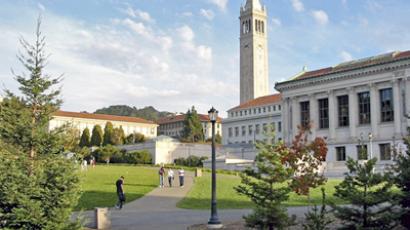Colorado approves lower tuition for illegal immigrants

Colorado has joined thirteen other states in allowing undocumented immigrant students to attend college at an in-state tuition rate. The governor hailed the new law as a victory that would grant illegal students with a “path forward”.
"Today we're here to tell you, in Colorado, that the doors are open and the dream is alive" said state Sen. Mike Johnston, one of the sponsors of the bill, as hundreds of people cheered at the ratification of Senate Bill 33.
Gov. John Hickenlooper signed the ASSET bill into law on Monday, standing before a crowd of hundreds at Metropolitan State University of Denver’s Student Success Center.
“Now you have to do the work,” he told the students, before taking out his cell phone and capturing a photograph of the cheering crowd.
“I’ve been waiting a long time to take that photo,” he said with a smile.
The new legislation will allow immigrants who graduate from state high schools to attend Colorado colleges at the in-state tuition rate that locals pay. Prior to the bill’s passage, undocumented immigrant students were prohibited from receiving postsecondary education benefits under the Illegal Immigration Reform and Immigrant Responsibility Act of 1996.
The law restricts in-state tuition benefits for an estimated 50,000 - 65,000 unauthorized immigrant students each year, according to the National Conference of State Legislatures. On average, the out-of-state tuition rate is three times higher than the in-state rate. About 1,500 undocumented high school students who graduate each year in Colorado will now be able to pursue higher education at a much lower cost.
Texas was the first state to introduce a bill granting immigrants the right to in-state tuition in 2001, and former lawmaker Val Vigil introduced the Colorado version after just a few states had passed their versions in 2003.
“It took 10 years of coalition building,” he said at the signing ceremony, recalling how only two people testified in favor of the bill and 20 testified in opposition when it was introduced. When the legislation was again discussed in 2008, illegal immigrant students who testified in favor of the bill were handed over to federal immigration authorities after their speeches.
But some lawmakers, the majority of which were Democrats, continued to push for the bill’s passage until all Democratic lawmakers unanimously supported the bill and three Republicans joined them.
Most Colorado lawmakers in the GOP are still opposed to the tuition measure, with some arguing that the bill would provide students with false hope because they would still struggle to find a job post-graduation, due to their illegal immigration status. And they would still be weighed down with college debt.
“I just don’t see how that provides a brighter future,” Republican Rep. Polly Lawrence told AP in March.
But Gov. Hickenlooper, surrounded by undocumented students who cheered for their new opportunities, was unable to hold back his excitement in the bill’s passing.
"Holy smokes, are you guys fired up?" he asked the crowd.
“Every kid matters," he said in a speech following the ratification. "We need every child that we can get to be as educated as they are capable."














